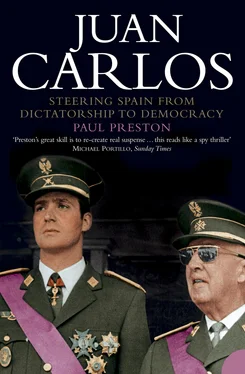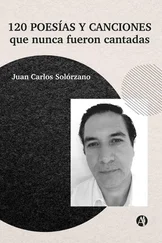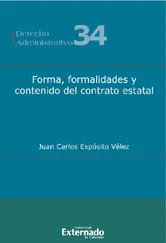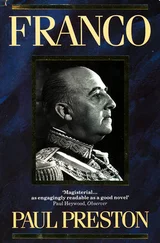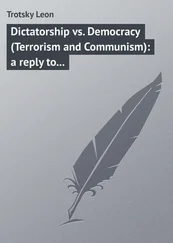Don Juan had originally planned for Juan Carlos to go to the prestigious University of Salamanca. This project apparently enjoyed the approval of Franco. For more than a year, the Prince’s tutor, General Martínez Campos, had been making preparations to this end. He had discussed it with the Minister of Education, Jesús Rubio García-Mina, and the Secretary-General of the Movimiento , José Solís Ruiz. He had also been to Salamanca, for talks with the rector of the university, José Bertrán de Heredia. He had found suitable accommodation and had vetted possible teachers. Then, suddenly, without warning, Don Juan began to have doubts about his Salamanca project in late 1959. On 17 December, General Martínez Campos had travelled to Estoril to make the final arrangements. On the following day, there ensued a tense interview at Villa Giralda. The general began with a report on Juan Carlos’s visit to El Pardo on 15 December. Apparently, after Franco had chatted to the Prince about what awaited him in Salamanca, he had told him that, once he was established at the university, he hoped to see him more often. Don Juan reacted by saying that he was thinking of changing his mind about sending his son to Salamanca. A furious Martínez Campos expostulated that any change in the arrangements at this late stage – after Juan Carlos had received his commissions in the three services – would be infinitely damaging for the prestige of Don Juan and of the monarchist cause. He was appalled that it might now look that he had lied in order to ensure that Juan Carlos received his commissions. He insisted that he would not leave Estoril until the issue was settled one way or the other.
On 19 December, the day after this disagreeable encounter, there was an informal meeting of several of Don Juan’s Privy Council. One after another, the Marqués Juan Ignacio de Luca de Tena, Pedro Sainz Rodríguez and others spoke against the idea of the Prince being educated at Salamanca, implying that it was a dangerous place, full of foreign students and left-wing professors. 100 This was most vehemently the view of the Opus Dei members, Gonzalo Fernández de la Mora and Florentino Pérez Embid. Fernández de la Mora and Sainz Rodríguez proposed that Juan Carlos be tutored at the palace of Miramar, in San Sebastián, by teachers drawn from several universities. Martínez Campos pointed out that Salamanca had been chosen for its historic traditions and for its position midway between Madrid and Estoril. He explained that his meticulous preparations – including the nomination of military aides to accompany the Prince – obviated all of the problems now being anticipated. He was mortified when, with a silent Don Juan looking on, the others furiously dismissed his arguments. At this humiliating evidence of his declining influence over Don Juan, he resigned. This occasioned considerable distress for Juan Carlos, who had become increasingly attached to his severe tutor. Over the next three days, the Prince made great efforts to persuade him to withdraw his resignation, as did his father. However, the fiercely proud Martínez Campos was not prepared to accept an improvised scheme dreamed up by Sainz Rodríguez, Pérez Embid and Fernández de la Mora.
Martínez Campos pointed out the dangers inherent in what Don Juan was doing – after all, Juan Carlos was an officer in the Spanish forces and Franco could post him wherever he liked, including Salamanca. Don Juan responded by asking him to accept the formal nomination of head of the Prince’s household, effectively the job that he had done for the previous five years. Concerned above all for his own dignity, Martínez Campos categorically refused to overturn his own plan and then supervise the implementation of the scheme of three men for whom he had little or no respect. He claimed that Don Juan’s vacillations would constitute irreparable damage to the image of the monarchy within the Army and in Spain in general. Furthermore, he argued that Franco would see this as evidence that Don Juan was ‘easily swayed by outside influences and pressures’. Don Juan ignored these warnings and gave him an envelope sealed with wax to take to El Pardo. It contained a letter to Franco explaining his change of mind. On the evening of 23 December 1959, General Martínez Campos took the overnight train to Madrid. On the following morning, he went directly from the station to El Pardo. Franco received him cordially and commented only that he was not surprised, ‘bearing in mind those who were always in Estoril. But, if he received the news with a shrug, his closest collaborators were in no doubt that he was mightily displeased. 101
The entire episode provided further proof that Juan Carlos was little more than a shuttlecock in a game being played by Don Juan and Franco. In 1948, he had been unfeelingly separated from Eugenio Vegas Latapié, the tutor of whom he was deeply fond. Having come to like, respect and rely on Martínez Campos during their six years together, the process was now repeated. Once more to lose his mentor and to be reminded that his interests were entirely subordinate to political considerations carried considerable emotional costs for Juan Carlos. He said later ‘The Duque’s [Martínez Campos’s] departure distressed me considerably, but there was nothing I could do for him. Nobody had asked for my opinion. It was as if I was on a football pitch. The ball was in the air and I had no idea where it was going to fall.’ It is indicative of the Prince’s relationship with his mentor that he made a point of spending time with him in the final days of his fatal illness in April 1975. 102
There can be no doubt that the clash between Don Juan and Martínez Campos had enormous significance for the future of both the Prince and his father. Major Alfonso Armada Cornyn, who had worked for Martínez Campos in overseeing the Prince’s secondary education, wrote later that this episode was the definitive cause of Don Juan’s elimination from Franco’s plans for the succession. Luis María Anson, a declared admirer of Don Juan’s senior adviser, claimed that the clash at Estoril had been deliberately planned by Sainz Rodríguez in order to provoke Martínez Campos’s resignation, ‘one of his most audacious and farsighted political masterstrokes’. In Anson’s interpretation, Sainz Rodríguez believed that, in tandem with Martínez Campos, Juan Carlos would be highly vulnerable to the machinations of hostile elements of the Movimiento. By engineering the departure of the general, Sainz Rodríguez was manoeuvring Juan Carlos into the orbit of Carrero Blanco and López Rodó. 103 In fact, the efforts of Don Juan and Juan Carlos himself to get Martínez Campos to withdraw his resignation make this difficult to believe. Moreover, López Rodó had already begun to throw his efforts behind the candidacy of Juan Carlos as successor. Rather than a farsighted and cunning plan on behalf of Juan Carlos, the manoeuvres of Sainz Rodríguez, Fernández de la Mora and Pérez Embid suggest a desperate attempt at preventing the Prince from eclipsing Don Juan as Franco’s successor. Sainz Rodríguez was concerned that, under the guardianship of Martínez Campos, Juan Carlos was being too smoothly integrated into Francoist plans for the future. In any case, whatever the aims of the choreographed ambush of Martínez Campos at Estoril, it merely consolidated Franco’s conviction that Don Juan was too easily influenced by advisers.
Indeed, one of the first consequences of the break with Martínez Campos was that General Alfredo Kindelán would resign as president of Don Juan’s Privy Council. A man of great dignity and prestige, Kindelán was replaced in early 1960 by the altogether more pliant and sinuous José María Pemán. The Opus Dei members Rafael Calvo Serer and Florentino Pérez Embid assumed key roles. 104 In the meantime, there ensued a lengthy correspondence that would give an entirely different tone to the contest between the Caudillo and Don Juan regarding Juan Carlos. If there had previously been any doubt, the interchange would make it unmistakably obvious that Franco was viewing the Prince as a direct heir while his father saw him as a pawn in his own strategy to reach the throne. The letter entrusted by Don Juan to Martínez Campos began with an expression of gratitude for Juan Carlos’s passage through the three military academies and for General Barroso’s generous speech in Zaragoza. Don Juan went on to refer to his deepening anxieties about the next stage of the Prince’s education. He repeated most of the arguments that had been put to Martínez Campos over the previous few days. What he was saying echoed the advice received from Sainz Rodríguez, Fernández de la Mora, Pérez Embid and others, including Rafael Calvo Serer. He referred to this group as ‘many people of great intellectual standing and healthy patriotism’. Alleging that Martínez Campos had hurried him into accepting the Salamanca scheme, he expressed the view that it would be better for the Prince to receive private classes from professors of many universities. Accordingly, he would prefer his son to be established in a royal residence with total independence. 105
Читать дальше
